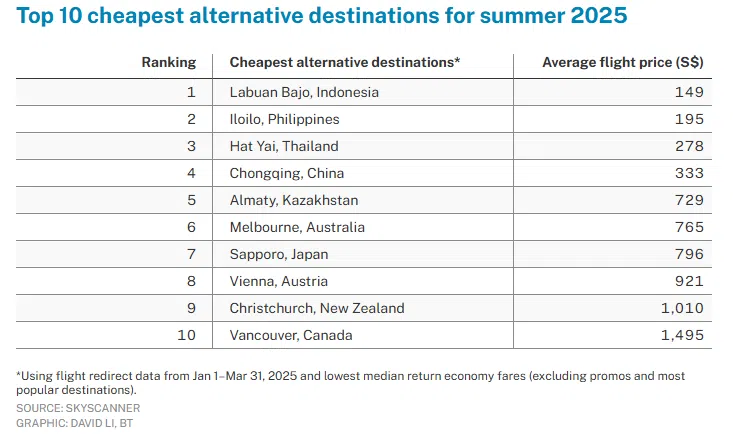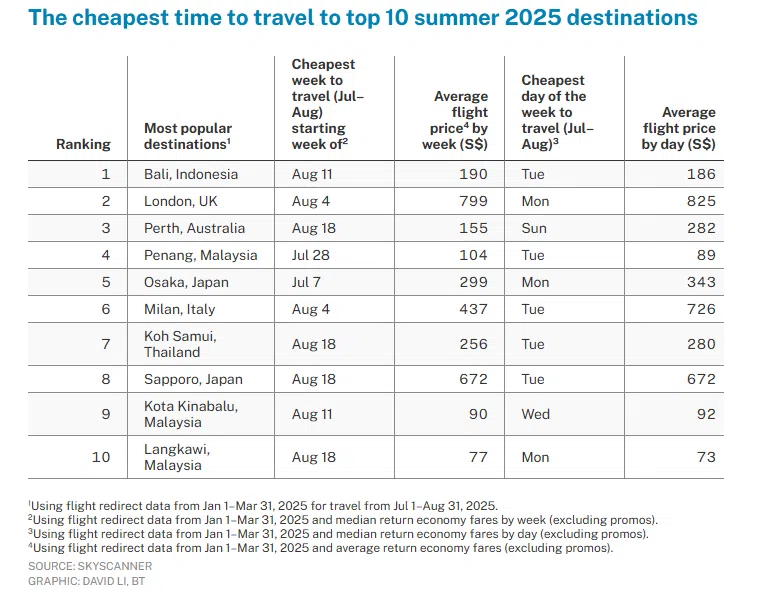🎓 Two grad trips on a student budget: How this Gen Z did it

Straight to your inbox. Money, career and life hacks to help young adults stay ahead.
[SINGAPORE] It has been a couple months since I wrapped up my undergraduate studies. But before commencing my new chapter at thrive, I managed to squeeze in two graduation trips – a much needed treat before settling into the rhythm of full-time life.
🛫 Tip #1: Fly during the shoulder season
By booking my trips during the shoulder season (February for Japan and April for Italy), I avoided costly airfares and accommodation rates, ultimately helping me cut back on my expenses.
The shoulder seasons are the periods between a region’s peak and off-peak seasons. Compared with off-peak seasons, which often bring extreme weather conditions, you can still enjoy favourable weather and greater accessibility to attractions during the shoulder months. Typically, that’s from March to May and September to November, though this varies with location.
For instance, I snagged a round-trip flight to Rome, Italy, in April for S$800, more than half that of peak season (June to August) fares, which can reach as high as S$2000 for economy class flights.
While there is no definite rule, I noticed flights with departures and returns on Tuesdays or Thursdays tend to be cheaper too.
Navigate Asia in
a new global order
Get the insights delivered to your inbox.
✈️ Tip #2: Take the flights less travelled
If you’re still making travel plans at this point, it may be tough escaping the upcoming summer season, when popular tourist destinations are bound to be packed.
However, it’s still possible to travel for cheap, if you’re open to being flexible with your destination – for instance, swapping overcrowded Bali with the less mainstream Labuan Bajo. The Indonesian fishing town ranked top on the list of cheapest “alternative” destinations compiled by travel search aggregator Skyscanner in a report last week.

Skyscanner says half of Singaporean travellers use some form of comparison tools to find better travel deals – so you may be missing out if you don’t.
If you’re willing to be flexible with shifting your travel dates, flying to popular destinations can still be within reach.

💲 Tip #3: Use the strong Singdollar to your advantage
When the Japanese yen hit record lows in late 2024, I took the opportunity to convert Singdollars ahead of time.
This allowed me to stretch my budget further during my graduation trip to Japan this year.

If you have yet to decide where to go, tracking the Singdollar can help narrow your options.
Right now, Australia, New Zealand and the US seem like good choices given the Singdollar’s strength against their currencies.
💡 Pro-tip: Some currency exchange platforms, such as Revolut, allow you to set a limit order to exchange your Singdollar to another currency at a rate you choose, and the order won’t be placed until that level is reached. This helps capture the best exchange rates without having to monitor numbers constantly.
🧑🎓 Tip #4: Capitalise on student deals
With a student identification card, you may still get student discounts for attractions, transport and even restaurants – so long as your card hasn’t expired.
For example, I was able to get a student ticket to the Vatican Museums and Sistine Chapel at 8 euros, whereas a full-priced ticket costs 20 euros.
Your student card can save you a few dollars here and there, which can quickly add up. So keep it handy when you travel.

🦺 Tip #5: Never trade safety for savings
Cheap prices may be tempting, but is it really a “good” deal?
For example, scammers may offer unusually low prices for a tour and run off after collecting prepayment, or deliver a tour that’s drastically different from what was promised. Some fraudsters have also created fake listings on vacation rental platforms, leading tourists to pay for non-existent properties.
So, try to stick with reputable travel companies and be extra cautious whenever a deal seems too good to be true.
💡 Pro-tip: I found that some travel platforms, such as Agoda, give out exclusive discounts through their apps, instead of on their website.
Finally, don’t skimp on travel insurance.

I was once hesitant to purchase travel insurance, perceiving it as an “added cost” to my already tight budget. That was until a friend suffered a serious spinal injury abroad in January.
Thankfully, she had bought travel insurance and her overseas and local medical expenses, including emergency medical evacuation costs, were fully reimbursed.
She tells me that after her accident, she won’t ever trade insurance benefits for cost savings in the future.
“The financial coverage and emotional relief really outweigh the premium that I paid for,” she says.
📋 Final checklist for your next trip
Here are a few other habits I picked up to stretch my travel budget further:
✅ For online bookings, pay in the currency of the country you’re visiting to avoid exchange markup fees
✅ If you’re travelling to multiple locations, booking a multi-city route can be cheaper than individual direct flights prices
✅ Use expense-splitting tools such as Splitwise to track shared expenses or opt for a joint spending card when travelling with friends

TL;DR
- Be flexible and fly during shoulder seasons to save more on flights and accommodations
- A strong Singdollar may stretch your travel budget further, although exchange rates tend to fluctuate regularly
- Reap discounts by making use of your student identification card before it expires
- Watch out for prices that seem too good to be true and book via trusted or official websites
- Travel insurance is a necessary investment, even on a student budget
Decoding Asia newsletter: your guide to navigating Asia in a new global order. Sign up here to get Decoding Asia newsletter. Delivered to your inbox. Free.
Copyright SPH Media. All rights reserved.


